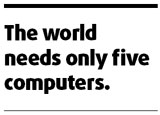New grids can reduce computers
Updated: 2008-02-22 07:31
In the early 1940s, IBM's president, Thomas J Watson, reputedly said: "I think there is a world market for about five computers." Some leading computer scientists believe that his seemingly ludicrous forecast may yet be proven correct.
Greg Papadopoulos, the chief technology officer at Sun Microsystems, recently declared on his blog: "The world needs only five computers." Yahoo's head researcher, Prabhakar Raghavan, backs Papadopoulos's view.
In an interview in Business Week last December, he said: "In a sense, there are only five computers on Earth."

Most striking of all, some researchers at IBM believe that five computers may be four too many. In a new paper, they describe how a single IBM supercomputer, which they codenamed Kittyhawk, may be all we need.
"One global-scale shared computer," they said, may be able to run "the entire Internet".
The idea is not that we will all end up using one big, central box to run our software and store our data. What these experts are saying is that the very nature of computing is changing. As individual computers are wired together with the fiber-optic cables of the Internet, the boundaries between them blur.
They start to act like a single machine, their chips and drives melding into a shared pool. Rather than writing software that runs on just one microprocessor inside one box, programers can write code that runs simultaneously, or in parallel, on thousands of networked machines.
Such giant computing grids, Papadopoulos said, "will comprise millions of processing, storage and networking elements, globally distributed into critical-mass clusters".
His point in calling them "computers," he said, "is that there will be some organization, a corporation or government, that will ultimately control" their construction and operation. Their many pieces will work in harmony, like the components inside your PC.
High-tech companies such as Google, Amazon, IBM and Deutsche Telekom are already building powerful computing grids that can do the work of thousands or even millions of individual servers and PCs.
It is always been possible to imagine a single giant computer taking over the work. But now, thanks to the explosion in computing power and network bandwidth, the barriers to building a universal computer are falling. Very bright people can talk seriously about a world where there are only five computers that all of us share.
The Guardian
(China Daily 02/22/2008 page9)
|
|
|
|
|
|